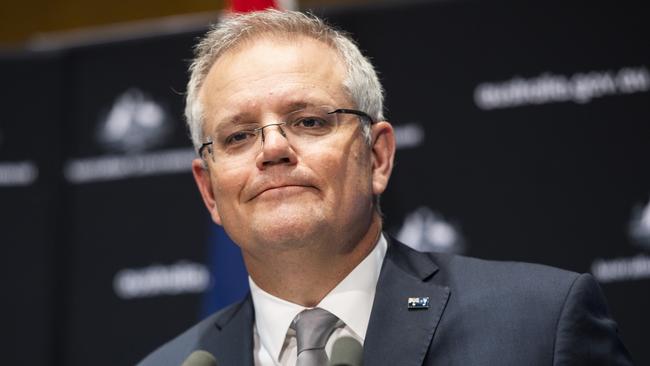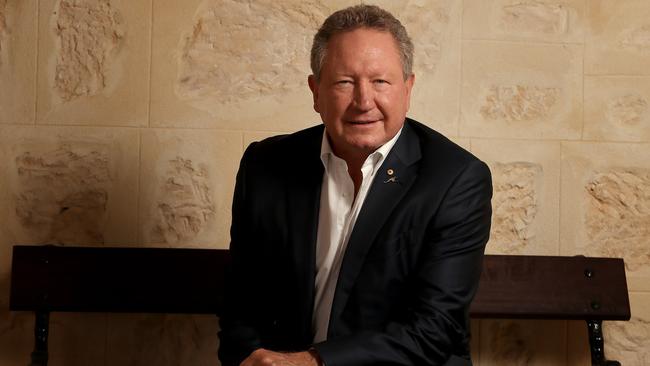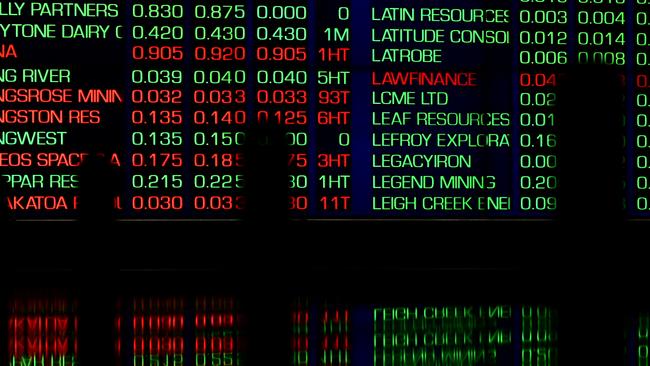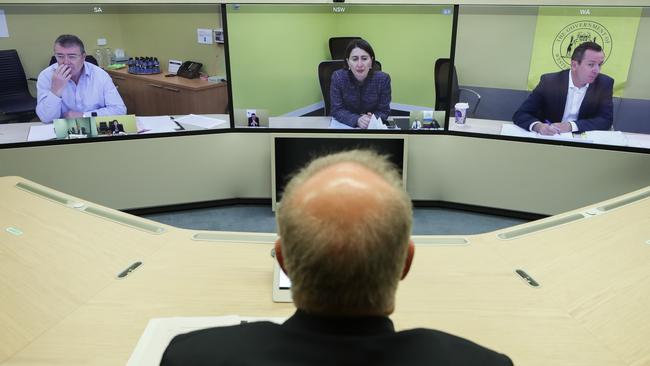State Premiers need to allow Scott Morrison to get Australia moving on from coronavirus
For the first time in decades, Australia faces real hardship. To get through it, we can’t afford the indulgent thinking – or state bureaucracy – that’s held us back in the past, writes Peta Credlin.
When the deputy chief health officer of Victoria calls Captain Cook an invader and likens him to COVID-19, we have a history problem.
When two of our leading business figures oppose an inquiry into the origins of the coronavirus because it might hurt our trade with China, we have a self-respect problem.
And when the same Premiers that demand we must all “heed the science on climate-change” reject the science on children going back school, we have a credibility problem.
Recovering from a corona crisis that will kill off tens of thousands of businesses, hundreds of thousands of jobs and hundreds of billions in national wealth will demand a comprehensive reset in the way we approach our country’s problems.
For the first time in decades, Australia faces real hardship and, to get through it, we can’t afford any more of the indulgent thinking that’s held us back.
All credit to the Morrison government for protecting Australia from the many thousands of deaths that this virus has caused in Britain, Europe, the US and elsewhere.
I’m not one of those who want to criticise them for locking us, and the economy, up in order to save lives; it’s lousy to want to punish our country’s success. But getting the economy back on track is likely to make the health effort look easy.

Last week, Roy Morgan estimated a staggering 10.5 million Australians have had a change to their employment due to this virus: 3.8 million have had their hours reduced, 2.7 million have been stood down, 1.4 million have had their pay cut and almost 700,000 have been made redundant.
The PM said on Friday that restrictions can now start to ease but it will be a long time before this virus has worked its way out of the economy. And that’s why the sooner we stop focusing on “First World problems” and get Australians back to work, the better.
Key in all of this has to be rebuilding manufacturing in this country — and, given high power prices are making the few industries we have left more and more marginal, fixing our energy mess remains an urgent priority.
For all the billionaires like Twiggy Forrest demanding the Prime Minister let China off the hook over this virus, let’s not forget it’s these same business types who contracted out to China all the things we used to make here for ourselves — putting balance sheet profit ahead of national security.
Yet there was Forrest last week, holding another dubious press conference to crow about importing goods from China that we used to manufacture here, then stinging the taxpayer hundreds of millions to reimburse him.

Is it any wonder people are angry about how economically dependent we have made ourselves on China — how much of our farming land, energy and water companies, ports, roads, agricultural processing plants and heaven knows what else we have sold off?
While big business might have turned a blind eye to the Chinese Communist Party’s longer-term agenda, the ordinary public are awake to it. Last year, only 32 per cent of Australians told a Lowy Institute poll they trusted China to act “responsibly” — a 20-point fall on a year earlier, and this was before the coronavirus. And 74 per cent agreed Australia was “too economically dependent” on China too.
Convincing Australians we need to make more here won’t be such a challenge. But it might be more difficult to get them to understand that, in order to achieve this, we must get rid of stifling rules and regulations that make operating a business here so hard.
So much of our green and red tape comes from bogus international agreements and bodies that politicians sign up to strike a pose without properly understanding the impact.
By all means, we must have laws in this country to protect our magnificent environment but those laws should be a reflection of what Australian voters decide is appropriate to strike the balance between new dams, power stations and development with whatever local frog is at risk, or the farce of punishing us for emissions caused overseas by our coal being burned there.

With well over a doubling of unemployment and a 10 per cent drop in GDP likely, persisting with the regulatory delays that have typically held up major projects looks like economic self-harm.
The federal government knows (even if the states mostly do not) that a strong recovery from this coronavirus crisis means lower taxes and less regulation, as well as a much more hard-headed approach to foreign investment, and self-reliance in strategic manufacturing.
A concern, though, are signals out of Canberra wanting a “consensus” on reform and suggesting the so-called National Cabinet might be the best way to achieve it.
The National Cabinet has worked well when the PM signs a big cheque but not so well when he doesn’t. So far, the National Cabinet hasn’t even been able to achieve a consensus on sending kids back to school, let alone hugely contentious issues like tax reform.
If everything has to be achieved by agreement with Labor premiers, then the bar is set low.
We might end up with a tougher line on foreign investment and maybe government intervention in strategic industries, but there’s no way we’ll get the greater economic reforms needed to get our economy back on its feet, and to start paying back the trillion-dollar debt left over from this crisis.

It’s leadership, not consensus, that’s needed to make a difference on hard issues. We only have a consensus now on border protection, for example, because the Coalition was prepared for a colossal fight to stop the boats. And this was only possible because orders could be given to the Navy that didn’t first require legislation in the Senate or the agreement of the states.
As things stand now, dams, power, planning, infrastructure, environmental regulation, public schools and public hospitals are all the legal responsibility of the states even if they are increasingly the political responsibility of the Commonwealth. Yet who really holds the states to account? Beyond maybe the premier, who can name relevant state ministers or even the opposition leader and how many of us actually understand how deeply in debt our states really are?
Since 2007, according to the Australian Election Study, our “satisfaction with democracy” has dropped 27 points to just 59 per cent. Much more than the revolving door prime ministership, my sense is that this is due to our national inability to get things done.
Of all the things that must change after COVID-19, this is No.1.
Peta Credlin is a columnist for The Daily Telegraph.

